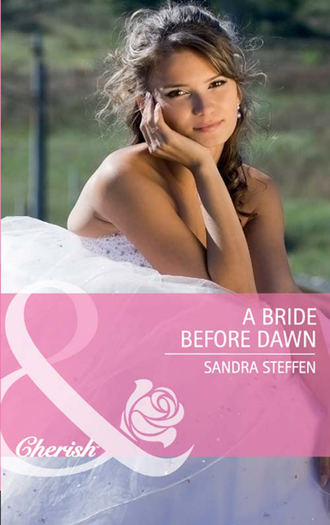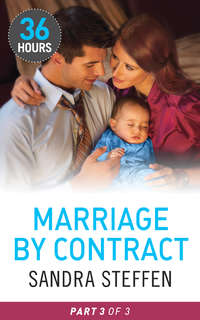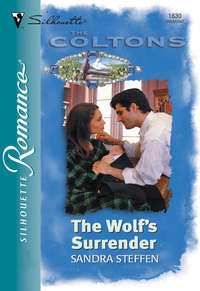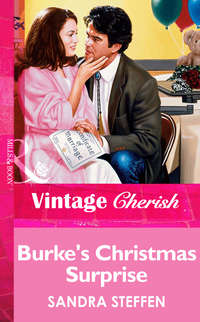
Полная версия
A Bride Before Dawn
Before either of them went a step further, Noah stopped them. “You can’t pluck some name off the internet or from the phone book for something this important.”
“Do you have a better idea?” Reed asked.
As a matter of fact, Noah did. For once in their lives, having a hellion for a brother was going to come in handy. “A few years ago I tested an airplane for a guy calling in a favor. He’s a P.I. over in Grand Rapids and flies a blue biplane called Viper. I don’t have a business card but I know somebody who does. I’ll make a few phone calls first thing in the morning.”
“Is this investigator any good?” Marsh asked.
Noah said, “He’s found runaways and exes and bail jumpers and just about everything in between.”
His stomach growled audibly. Trying to remember how long it had been since he’d eaten, he went to the refrigerator and opened the door. He saw various cartons, bags and containers of leftover takeout, one of which was starting to resemble a science experiment. This was why he always cooked when he was home.
“When are you leaving?” Marsh asked.
“I’m not,” Noah said, cautiously sniffing a carton before tossing it into the trash. The science experiment went in next.
“You don’t have another flying engagement lined up?” Reed asked.
“It’ll keep.” Unlike the leftovers on the top shelf. “I’m not going anywhere until this is resolved. I figure we can use a couple of extra hands around here.”
While Noah threw out everything except eggs, butter, condiments and cans of soda and beer, Marsh and Reed talked about what they might expect on Joey’s first night here. According to the information Reed had gotten from the 83,000 Google hits, children this age generally required a feeding every two to six hours.
“You’re saying we could be in for a long night,” Noah said, closing the refrigerator.
Reed was fast at work on a preliminary schedule. Following a little discussion, Noah was assigned the third watch.
He ate a peanut-butter sandwich standing up. After chasing it down with a cold beer, he strode to the stairway on the other side of the room. “I’m going to get some sleep. Wake me up when you need me. I mean it. We’re in this together.”
“Noah?” Marsh said quietly.
With one hand on the doorknob, Noah looked back at his oldest brother.
“I’m glad you’re here,” Marsh said.
“Glad barely scrapes the surface,” Reed said, closing his laptop.
Something constricted deep in Noah’s chest. “I’m glad to be here.” It was the honest-to-God truth.
He could have left it at that, but opportunities like this didn’t come along every day, so of course he cocked his head slightly and said, “Sex on the beach, and big hair and big—” He cleared his throat. “Who knew you two had it in you?”
He dodged the roll of paper towels Marsh threw at him, and took the steps two at a time. In his room at the end of the hall, he emptied his pockets of his keys and change and put the check from Tom Bender on his dresser, then quickly stripped down. Heading for the only bathroom on the second floor, he thought about the apology he owed Lacey.
He turned on the shower. While he waited for the water to get hot, he considered possible ways he might say he was sorry. Red roses, he thought as he lathered a washcloth and scrubbed the day’s grime from his arms, chest and shoulders. In his mind’s eye he saw a dozen red roses upside down in Lacey’s trash can. A box of chocolates would meet with the same fate.
By the time he dried off, he knew what he had to do. It wasn’t going to be easy.
Begging forgiveness never was.
Chapter Three
Sure, the rusty thermometer on the light pole in the alley behind Bell’s Tavern registered eighty-one degrees, but the bright afternoon sunshine wasn’t the only reason Ralph Jacobs was sweating.
“You’re getting a bargain,” Lacey said patiently as her dad’s former customer placed another bill in her outstretched hand.
“Six hundred’s a little steep, doncha think?” he groused, mopping his forehead with a folded handkerchief. “That old Chevy is close to twenty years old, you know.”
She glanced at the pickup truck now sitting on Ralph’s flatbed trailer. She could have gotten more for her dad’s pickup if she’d had time to advertise, and they both knew it.
Turning her attention back to the transaction, she watched as Ralph wet his finger and reluctantly added another hundred spot to the others in her hand. “Dad always took good care of that truck,” she said. “It was ten years old when he bought it. Remember how proud he was that day? It still has low mileage and started just now the first time you turned the key. You and I agreed on $600.”
“It has four flat tires,” he insisted.
“I threw those in at no extra charge.”
Ralph made a sound she would have been hard-pressed to replicate. When he finally parted with the sixth hundred-dollar bill, she handed him the signed title and tucked the money into the pocket of her faded cutoffs for safekeeping.
Just then Lacey’s best friend came hurrying down the steps, her light brown curls bouncing and her white blouse nearly as bright as the sunshine. “It was good of you to offer to drop these boxes at Good Neighbors on your way home, Mr. Jacobs,” April Avery called as she secured the last carton on the trailer with the others.
Ralph made that sound again, because it hadn’t been his idea.
April was one of those savvy, quirky women nobody could say no to. She’d moved to Orchard Hill after she married into the large Avery brood seven years ago. She and Lacey had clicked the first time they met and had become the best of friends in almost no time.
Together they watched as the trailer carrying many of the things Harlan Bell could no longer use rattled away. The moment they were alone again, April pushed her curly hair behind her ears and exclaimed, “I thought he would never leave. Now, finish your story.”
“Where was I?” Lacey asked. As if she didn’t know.
“You were just getting to the good part,” April said. “Noah threatened to break your door down if you didn’t open it, and the instant you did, he took you in his arms and kissed you so thoroughly you swooned. That is so romantic.”
There was never much activity in the alley at this time of the afternoon in the middle of the week. Two boys had taken a shortcut through here on their bikes a few minutes ago. A panel truck was making a delivery to the appliance store at the other end of the alley, but the deliverymen were too far away to hear Lacey say, “I did not swoon. And it wasn’t romantic.”
“Then your heart didn’t race and your knees didn’t weaken and butterflies didn’t flutter their naughty little wings in unmentionable places?” April asked.
Lacey held up a hand in a halting gesture. Just thinking about Noah’s kiss was stirring up those butterflies again.
“That’s what I thought,” April said, nudging her with one shoulder. “You’re lucky. The only romance I’ve had since Jay’s been deployed is via webcam. Trust me, it’s not the same as real kissing.”
Lacey stared at her friend. “You and Jay have webcam sex?”
“Never until after the twins are in bed, but we’re talking about you.”
Smiling at April’s one-of-a-kind sense of humor, Lacey wandered to the metal trash can lying on its side under the stairway. She set the can upright and put the lid on with a loud clank. Next, she unlocked the tavern’s back door and the two of them went inside.
April’s in-laws owned the busiest realty company in Orchard Hill. She’d been working in the office and pursuing her real estate license since her husband, a guardsman, had been called to active duty eight months ago. She was here this afternoon as Lacey’s friend but also to offer her professional opinion regarding a selling strategy for the tavern. It would be her first solo listing.
While April poked her head into the empty storage room that had once housed kegs of beer and crates of liquor, Lacey went to the front door and propped that open, too. Standing in the slight cross breeze, she tried to see the place through a Realtor’s eyes.
When it came to bars in Orchard Hill, Bell’s Tavern had been near the bottom of the food chain. Lacey had always gotten the impression that her dad had liked it that way. Originally, the building had been a mercantile exchange. It had passed hands several times before being converted into a tavern eighty years ago. The ceilings were low, the sidewalls were exposed brick and the hardwood floors desperately needed refinishing. The tavern’s most redeeming features were the old speakeasy door from Prohibition days, now leaning against the wall in the storeroom, and the ornate hand-carved mahogany bar and matching shelves behind it. The mirror had been cracked when her dad bought the place, so she couldn’t blame that for her run of bad luck this past year.
She thought about the itemized hospital bill tucked inside her suitcase upstairs. Before her phone had been shut off, bill collectors had called at all hours of the day and night. The wolves were at her door.
“Do you think Avery Realty will be able to find a buyer for this place?” she asked.
“Is that really what you want?” April countered.
Sliding her hands into the pockets of her cutoffs where all the money she had to her name crinkled reassuringly, she said, “I have to sell, April.”
April gave one of the barstools a good spin. “Don’t mind me. I’ve been having serious separation issues ever since Jay left for Afghanistan. It’s selfish of me, but I want you to stay. Don’t worry, we’ll find a buyer for this place, although in this economy it could take a little while. In the meantime, I’ve been thinking about the hidden treasure your dad mentioned before he died.”
“I’ve searched everywhere,” Lacey insisted, putting one of the cameras from her mother’s collection back on the high shelf where she’d found it. “There’s nothing here. Even this old Brownie has more sentimental value than monetary worth.”
“Maybe the hidden treasure isn’t a tangible object,” April said. “I think that’s what your father was trying to tell you.”
“What do you mean?” Lacey asked.
April stopped testing every barstool and looked back at her. “You’re in Orchard Hill and Noah is in Orchard Hill. Maybe the hidden treasure is the lodestar that keeps bringing you two together. You know, Fate.”
“Oh, man, I hope that wasn’t what he was talking about,” Lacey declared. “I’m not even on speaking terms with Fate anymore.”
Lacey was relieved when April let the subject drop, because she couldn’t have argued about the unreliability of Fate with someone whose husband was dodging land mines and shrapnel on the other side of the world. Leaving her friend to get the measurements she would use in the real-estate listing, Lacey took stock of her situation.
She’d taken a leap of faith when she’d moved to Chicago more than two years ago. It was never easy to start over in a new place, but she’d made a few friends there, and although her job as an administrative assistant had been mundane much of the time, it had paid the bills. She’d taken night classes and dared to believe that her future had potential.
Then her dad died and the company she’d worked for downsized and she was let go. A few months later she’d wound up in the emergency room, and what was supposed to have been a simple surgery sprouted complications. Not long after that, she’d received an eviction notice. Her last temp job had barely left her with enough money to cover the bus ticket back to Orchard Hill. She didn’t know how she would ever repay the hospital unless she sold the tavern. So, no, she didn’t care to place her faith in something as flighty as Fate.
When April had all the information and measurements she needed to pull some comparables and start working on a selling strategy, Lacey saw her to the front door. After promising to come by later to see April’s three-year-old twin daughters, Lacey flipped the dead bolt. She was on her way to turn out the light in the storeroom when she noticed a cue stick lying on the pool table in the corner. She headed over to take care of it, the quiet slap of her flip-flops the only sound in the room.
There was a nagging in the back of her mind because she didn’t recall seeing the cue stick lying out when she’d been down here yesterday. Wondering if she simply hadn’t noticed, she went around to the other side of the pool table to put the stick away. She hadn’t gotten far when she saw something on the floor beneath the pool table.
She bent down for a closer look and found a sleeping bag carefully tucked under the wood skirting of the pool table. Her breath caught and a shiver ran up her spine.
She might have overlooked the cue stick, but she’d swept these floors yesterday and was positive the bedroll hadn’t been here then. That meant somebody had been here between last night and today.
How could anyone have gotten in? The doors and windows had been locked, the whole place battened down tight.
She searched her mind for a possible explanation. If Orchard Hill were a larger city, she might suspect that a homeless person was camping out in the empty tavern. She was more inclined to think a teenager or a college student might have done it. That didn’t explain how someone could have gotten in. And since when did teenagers or college students fold things up neatly? It didn’t make sense to leave the sleeping bag here.
Lacey went perfectly still. Maybe the intruder hadn’t left.
Was someone here now?
Her heart raced and goose bumps scurried across her shoulders. Shattering beer bottles and loud voices didn’t frighten her, but this eerie quiet had her imagination running wild.
There was a light on over the bar and another one over the pool table. The windows on the east wall faced the brick building next door, allowing very little natural light inside. Suddenly, every corner in the room seemed too dark and every doorway a potential hiding place for someone lurking menacingly in the shadows.
From behind her came a soft thud. Her hand flew to her mouth and her breath lodged in her throat.
The sound came again. It was a footstep—she was sure of it—followed by the creak of a floorboard. She spun around. And saw Noah pause just inside the back door.
“Oh! It’s you,” she said on a gasp.
Noah came closer, one thumb hitched in the front pocket of low-slung jeans. The fingers of his other hand were curled around the handle of an infant carrier.
His eyes were in shadow, but one corner of his mouth lifted in a humorless grin. “The door was open so I didn’t knock. I didn’t mean to startle you,” he said. “I came here to tell you I’m sorry. I guess I should apologize for scaring the daylights out of you while I’m at it.”
Prying the cue stick out of her clenched hands, she laid it on the table where she’d found it. She carefully wound her way around small tables with mismatched chairs, and arrived at the bar shortly after him. She was glad when he started talking, because she would have had a hard time getting anything past the knot in her vocal cords.
“There’s someone I’d like you to meet.” He lifted the car seat a little higher so she could see the baby sleeping inside. “My nephew, Joseph Daniel Sullivan. He likes to be called Joey.”
“Your nephew?” she managed to ask.
“You don’t have to keep your voice down,” Noah said. “He can sleep through anything, as long as it’s his idea.”
So the child already had a mind of his own. He sounded like a Sullivan, Lacey thought.
Gently, Noah placed the car seat on the bar and continued. “I had no right to accuse you of leaving Joey on our doorstep last night. It’s no wonder you didn’t join us for dinner today. That reminds me.” He reached into a canvas bag he’d placed beside the baby, and brought out a clear, covered bowl of spaghetti. “I brought a peace offering.”
The next thing she knew she was holding the bowl, still slightly warm, in her hands.
“Are you ever going to say anything, Lacey?”
She raised her chin and opened her mouth only to reverse the process. She didn’t know what to say. What did a girl say when she was standing three feet away from her first love, a man who looked as if he hadn’t slept, a man whose dark hair was a little too long to be considered civilized, but who continued to keep a steady hand on the car seat where an unbelievably small baby slept?
“Did you use your homemade spaghetti sauce?” she asked, only to groan aloud.
She could tell by the slight indentation in his left cheek that his grin was no longer humorless. “Would you accept my apology if I said yes?” he asked.
Lacey wasn’t ready to smile. She wasn’t one to get angry and get over it. For her, forgiveness was a process. “So this is Joey,” she said, moving to a safer topic. “Have you determined whose son he is?”
With a shake of his head, Noah said, “We won’t know for sure until Marsh and Reed have a DNA test and get the results. Meanwhile, they’re hoping they can locate Joey’s mother as quickly as possible, not that it’s going to be easy. They’re meeting with the P.I. right now. I’m on baby duty. You can ask me anything you want, but first, I’d like to finish my apology.”
Lacey placed the bowl of spaghetti on the bar with her camera. Settling onto one of the stools, she made a show of getting comfortable.
Noah eased onto the stool next to her. Looking at her in the mirror, he said, “Our breakup two-and-a-half years ago came as a shock to me. Hell, it blew me out of the sky. Looking back, I realize it shouldn’t have.”
She wanted to tell him to stop, because this was dangerous territory, more dangerous than he knew. She took a deep breath and willed herself to hear him out.
“I don’t know how I could have missed the clues,” he said. “But I did. If there was a little kid within a hundred feet, your eyes were on him. Just like now.”
She dragged her gaze from Joey and stared at Noah’s reflection. He had the tall, rangy build of a barroom brawler. One of these days he would probably get around to shaving, but it wouldn’t change that moody set of his lips or the depth in his brown eyes. He rarely talked about himself. On the surface, he was all bluster and swagger. If a woman was patient and paid attention, every once in a while she caught a glimpse of the part of him he kept hidden most of the time.
One day after she’d been seeing him for about a year, he’d taken her flying. It was during that flight that she’d learned how he felt about becoming a father. He was wonderful with kids—she’d seen that for herself—but his feelings about parenthood had nothing to do with how children responded to him and vice versa. That May morning, two thousand feet above the ground, he told her about the day his parents died in an icy pileup on the interstate.
Every now and then someone in Orchard Hill recalled a memory of Neil and Mary Beth Sullivan. Noah’s mother and father had been well liked and were sadly missed. It was common knowledge that Marsh had stepped directly out of college and into the role of head of the family after they’d died, and that Reed came home two years later to help. The youngest, Madeline, had been everyone’s darling, and Noah was the hell-raiser everybody worried about.
Until that day, Lacey hadn’t known he’d been in the car when it crashed. With his eyes on the vast blue sky outside the cockpit and the control held loosely in his able hands, he’d described the discordant screech of tires and the deafening crunch of metal. Trapped in the back, he hadn’t been able to see his parents. But he’d heard the utter stillness. The silence. Fifteen-year-old Noah had walked away with a broken arm and minor cuts and bruises—an orphan. He didn’t remember much about the days immediately following the accident. During the burial, the fog in his brain had lifted and he’d solemnly vowed that he was never going to put a kid of his through that. He wasn’t going to have children. Period.
Over the years she’d tried to find the words to tell him that lightning didn’t strike twice and that their children wouldn’t be orphaned. But who was she to make that promise?
She’d loved him, and for a long time she’d told herself what they shared was enough. He was right, though. She never had been able to keep her eyes off little ones. After April and Jay had their twins three years ago, yearning to have a baby of her own became an ache she couldn’t pretend didn’t exist.
“Until you spelled it out for me,” he said, drawing her back to the present, “I didn’t know you even wanted kids. But you did. And I didn’t. It was a classic breakup. End of story, right?”
Lacey remembered the day she’d ended things with Noah. They used to fight sometimes. When it happened, their arguments were messy and noisy. That final night neither had raised their voices. It made their breakup unforgettable on every level.
“Then we wound up in bed last year,” Noah said. “And Joey is about the right age to have been a product of that night. That’s no excuse for barging into your apartment last night and accusing you of deserting him. I hadn’t seen you in a while, but I should have known. People don’t change. You knew how it felt to lose your mother. You never would have left a baby on my doorstep. Slapping me with a lawsuit or siccing the cops on me—that I could see you doing.”
Nothing else could have made her smile just then.
Their gazes met, and this time it wasn’t in the mirror. Emotion swirled inside her, welling in her eyes. Her doctor in Chicago had told her that sudden tears were part of her healing process. She had a feeling it was too much to hope that Noah didn’t notice.
She knew how she looked. Her fine dark hair skimmed her shoulders and turned wavy in the summer humidity. Her shorts were threadbare, her T-shirt was thin and her breasts were sensitive. No doubt he noticed that, too.
She found herself looking into his eyes again. It was easy to get lost in that dark brown gaze. There was a time when she wouldn’t have been able to drag her eyes away. Last night, for example, and a hundred other nights, too.
Today she flattened her hands on the worn surface of the bar and slid off the far side of her stool. “Okay. I forgive you for scaring the daylights out of me and for accusing me of leaving Joey on your doorstep.”
He stood, too. Cocking his head slightly, he said, “Can I get that in writing?”
She rolled her eyes, but she couldn’t help smiling, too. Feeling lighter—perhaps there was something to this forgiveness business—she spied her favorite 35 mm camera. The instant it was in her hands, she felt back in her element. She aimed it at Joey, adjusted the focus and snapped a picture.
The poor baby jerked. His little hands flew up and his eyes popped open. Surprisingly, he didn’t cry. Instead, he found her with his unwavering gaze.
His eyes were blue and his cheeks were adorably chubby. Fleetingly, she wondered how his mother could stand to be away from him for even a day.
“I’m sorry,” she murmured quietly. “I didn’t mean to startle you. The next time I’ll ask for permission before I take your picture. Deal?”
The change in his expression began in his eyes. Like the wick of an oil lamp at the first touch of a lighted match, delight spread across his little features, tugging the corners of his lips up until his entire face shone.
“May I take another one?” she asked him.
He smiled again, this time for the camera. He was a Sullivan all right. Marsh and Reed didn’t need a DNA test to determine that much.
“I can’t believe it,” Noah said.
She glanced up and snapped his picture, too. “What can’t you believe?”
“It’s the first time I’ve seen him smile. He obviously has good taste in women.”
She wished she didn’t feel so complimented.
“Would you like to hold him?” he asked.
She ached to. “Maybe some other time.”
There was a moment of awkwardness between them. They weren’t a couple anymore, and neither knew what to say. After a few more seconds of uncomfortable silence, Noah picked the baby carrier up by the handle, an effortless shifting of muscles and ease, and said, “I guess I should get this little guy home.” He slipped the strap of the diaper bag over one shoulder then started toward the back door where he’d entered ten minutes earlier.









